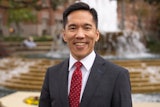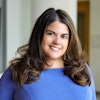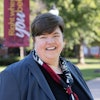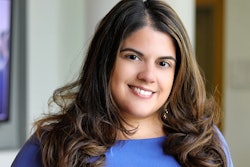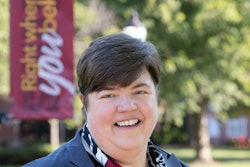Accepted into Education City
American universities setting up campuses in the Middle East represent the next step in the globalization of U.S. higher education
Christina Asquith
Just minutes from the Persian Gulf’s translucent blue waters, through the flat, white desert and past the headquarters of the Al Jazeera news network, a large sign in both Arabic and English reads: “Welcome to Education City.”
Inside the 2,500-acre, well-guarded compound, students from across the Arab world are enrolled in one of five premier U.S. universities that have arrived in the Middle Eastern country of Qatar in recent years to deliver American-style education and degrees. The institutions include Carnegie Mellon University, the Georgetown School of Foreign Service, Texas A&M University, Virginia Commonwealth University School for the Arts and Weill Cornell Medical Center, which offers the first and only American medical degree outside of the United States.
Qatar’s Education City, perhaps the world’s most diverse campus, is almost entirely unknown in the United States, but represents the next step in the globalization of American higher education — international franchising. Aided by technology such as online libraries, distance learning and streaming video, U.S. universities offer — and charge tuition for — a combination of live and digital education that is supposedly indistinguishable in quality from that received on the home campuses.
The exportation of U.S. education could bring tremendous educational opportunities and financial gain for universities. But no one is precisely sure how this bold experiment will turn out.
“No one has ever done this before,” says Dr. James Reardon-Anderson, dean of Georgetown School of Foreign Service in Qatar. “This is not ‘Georgetown Lite.’ If we screw up, people will be walking around with a Georgetown degree who don’t deserve it.”
Royal Backing
Education City is the brainchild of the ambitious and popular Qatari royal family, the Al-Thanis, who run this enormously wealthy country of 800,000 people. Qatar, a neighbor of Saudi Arabia, rests on a rich bed of oil and natural gas, and the Qatari royal family has spent billions building Education City, traveling the globe courting top universities and companies.
As part of the deal with American universities, the Qatari royal family is footing the entire bill, from constructing architecturally stunning lecture halls to paying professors’ travel, housing and salaries. They have also agreed to take a “hands-off” approach in regards to content and course material. This intellectual openness, while unusual in the Arab world, is part of Qatar’s broader plan to “reclaim the luster of Arab education after centuries in the dark ages,” say planners.
The vast experiment is in its embryonic stages. The Al-Thanis are currently in talks with a U.S. postgraduate business school and a U.S. journalism school. An $8 billion teaching hospital, expected to be the region’s best, is also under construction, to be opened in 2010. There are currently more than 450 students enrolled, and the population will grow to between 7,000 and 10,000.
“The whole world is going global, so why should higher education be any different?” asks Maggie Robbins, executive assistant at the Middle States Commission on Higher Education, which has seen its international accreditation grow rapidly.
Most of the American professors and administrators involved in Education City admit to being taken aback when first approached about going to Qatar, which is about the size of Connecticut.
“I said, ‘I don’t know how to play the guitar,’” recalls Peter Martin, assistant professor of graphic design of VCU, when he was first approached about the opportunity by his department dean. “And he said, ‘No, Qatar.’ I didn’t know anything about Qatar. But my wife thought it would be an adventure, and we agreed to come here one year. That was in 1999.”
By September 2006, 170 professors will be in all five campuses, a student:faculty ratio of about 1:10. Slightly more than half of the professors are from the United States. Most are young couples looking for adventure and travel. Others are nearing retirement and see Qatar as a final career stop. All mention the enormous opportunity to play a positive role in creating dialogue between the East and West in this time of heightened tensions between the two regions.
“Our courses are designed to have the kids wrestle intellectually with the question of faith and religion,” says the Rev. Ryan J. Maher, assistant dean for academic affairs, who teaches the course, “The Problem With God,” at Georgetown’s Qatar campus. “They haven’t done that before.”
Education City is overseen by the Qatar Foundation for Education, Science and Community Development, a nonprofit organization, based in Doha. It was established in 1995 by Qatar’s emir, Highness Sheikh Hamad Bin Khalifa Al-Thani, shortly after he overthrew his father’s moribund regime in a bloodless coup.
With only one local university at the time, the emir wanted to diversify his economy and invest in his people. Rather than start an educational system from scratch, he decided to recruit the best of the best in higher education. The first university to arrive in 1998 was VCU’s School for the Arts, followed by Weill Cornell Medical School in 2002; Texas A&M University’s engineering program in 2003; Carnegie Mellon’s business administration program in 2004; and most recently Georgetown University School for Foreign Service in 2005. In addition to the incoming journalism school, MBA program and teaching hospital, there will also be a massive science and technology park that includes Microsoft, ExxonMobil, General Electric and Rolls Royce. Taken together, you have one mega-university made up of cherry picked U.S. undergraduates and graduate programs aimed to serve the Arab world.
The public face of the foundation is the Royal Highness Sheikha Mozah Bint Nasser Al Missned, the second of the emir’s three wives. She travels the world, is special envoy to UNESCO and sits on various boards, including the board of Cornell’s medical school. By almost all accounts she is an impressive figure. Students and faculty regard her as a serious intellect with a progressive vision for her country, which includes an active role for women.
“She is creating a path for us,” says Rooda Al Neama, 19, a Qatari student enrolled in Carnegie Mellon’s business program. “We were the first class, and she sat down with us and told us, ‘You are my daughters. You are leading the way for women. You have the responsibility so use it wisely, but do not be afraid.’”
Education for Sale?
Qatar’s natural gas resources give it one of the highest per capita incomes in the world, approximately $40,000 per year. And while the nation’s wealth makes anything possible, it also makes it possible to do absolutely nothing. If Qataris work at all, most prefer the short workdays and professional security provided by government jobs.
The country’s financial cushion leads some to question whether the royal family isn’t trying to simply buy a university system and a culture of education — questions that take on particular gravity when a U.S. medical degree is at stake.
“Now we have the best universities here, but our Qatari students are struggling and they find it hard work because they haven’t had a strong background with high standards in subjects like math and chemistry,” says Doha businessman Hassan Al Jefairi.
The royal family says it is also investing heavily in improving Qatar’s K-12 education system by hiring the California-based RAND Corporation to run a series of private charter schools. But education reform takes time and American universities are already up and running and looking for students.
Most U.S. universities won’t reveal their financial arrangement with Qatar, except to say, somewhat defensively, that it was not the main motivation for their presence. In a 2001 press release, Cornell estimated its operating costs at $750 million for the first 10 years, which the Qatar Foundation covers. Typically, the foundation also gives universities a “gift” of between $10 and $50 million. According to the Raleigh News & Observer, the University of North Carolina at Chapel Hill rejected an offer in 2002 to bring a business school to Qatar after the royal family offered only $10 million. The school had reportedly sought a $35 million gift in addition to operating costs.
The American universities say there is no quota for Qatari students; however, Qatar Foundation literature and published reports repeatedly state a goal of 60 percent to 70 percent Qatari enrollment.
Of the 50 students currently in Weill Cornell’s medical program, only seven are Qatari. Weill Cornell spokesman Michael Vertigans says the institution is doing its best to increase Qatari representation by enrolling them in the two-year premed program, which offers no guarantee of acceptance into medical school.
“The admissions office is in New York,” Vertigans says. “There’s no difference [in standards of applicants].”
Recently, this issue was exacerbated when the Qatari Foundation announced it might cut financial aid to foreign students while continuing to pay most of the tuition for its own students, in effect narrowing the competition against Qataris. Currently, tuition in Qatar is the same as the U.S. campuses (upwards of $30,000 a year for Georgetown). Students pay that tuition to the Qatar Foundation, which in turn pays an undisclosed fee to the universities.
Approximately half the students in Education City are Qatari, and the rest represent more than a dozen nations, mostly in the Middle East, although there are one or two American students enrolled. Professors at Georgetown say that teaching at an elite international school was part of what attracted them to Education City, and they are encouraging the foundation to continue the financial aid.
Western Influences
Relaxing after a graphics design class at VCU’s School for the Arts, friends Farah Al Ali, 20, Mashael Al Thanki, 20, and Reem Alsai, 21, talk about their upcoming graduation, and how they are the first generation of women looking for a job instead of a husband.
“I want to work at Al Jazeera because my designs will go worldwide,” says Alsai.
Three young Filipino women approach to take the students’ book bags to the chauffeured car that idles in the parking lot. On the university door, a sign reads, “Students, Please Remind Your Maids That They are Not Allowed Beyond the Entrance.”
Although Qatari women are increasingly being allowed more freedoms — some even drive now — many say their families will not allow them to travel abroad, so Education City represents their only opportunity for a Western-style education. Most Qatari women wear their traditional veil by choice, custom or their family’s insistence. The large black veil, called an abaya, covers their head and entire body except their hands and feet. Still, the university girls modernize this traditional dress by donning stylish black Chanel sunglasses and carrying hot pink Gucci purses.
While student have rapidly adapted to the introduction of Starbucks and cell phones, the deeper cultural differences in this strict Muslim country remain. Unmarried men and women in Qatar rarely interact, and professors say they self-segregate in the classrooms and often refuse to work in groups. Gender is a deeply sensitive issue. In one incident, an American male professor rushed to help a female student who cut her hand in design class. He says she gave him a mortified look because he touched her hand.
Most of the university buildings are equipped with prayer rooms. Currently, no one knows of any Jewish professors in Education City, but most think it would not be an issue. Cornell’s medical school is, after all, named after Sandy Weill, a prominent Jewish businessman in New York.
If anything, the students are hungry for more exposure to new ideas, including different religions, gender relations and commercialism. Most students say they like American-style education, in which students challenge the professors and the classroom is interactive. Professors say that while most students have not been as exposed to intellectual discussions as American students, they are ambitious learners and more respectful.
Qatar’s Carnegie Mellon students say Arab universities typically focus on hard sciences at the expense of softer sciences, such as psychology and philosophy. They are enjoying Carnegie Mellon’s diverse curriculum, which recently added a creative writing class.
Most of all, they are aware of the value of a diploma from an American university.
“When we say we graduated from Carnegie Mellon, it’s a really good thing,” says Wesam Said, 19, of Iraq, whose father is a professor at the local university. “It makes you feel like you could get a job anywhere.”
Tradition vs. Modernization
Qatar is a in complex corner of the Middle East, even for veteran Arab experts. Most famously home to Al Jazeera, the highly regarded but controversial Arab news network that the Bush administration repeatedly condemns as encouraging terrorism, Qatar is also home to Al Ueid, a massive American military base, from which the United States launched its attack on Iraq. Education City professors say they have been put on “high alert” by the U.S. Embassy in Qatar because of growing tensions with Iran, and there is an evacuation plan in place in the event of any serious anti-American threats. Last year, Qatar experienced its first suicide attack, when an Egyptian attacked a Doha theater popular with Westerners, killing one British citizen. The attack followed a statement issued by Al-Qaeda encouraging attacks against “crusaders” in the Gulf region.
Modernization is sweeping through Doha, nicknamed “Crane City,” due to the innumerable skyscrapers under construction. According to American professors, Qatar is struggling to modernize without provoking the violent backlash from Al-Qaeda or other Islamic extremist groups who view the West as the enemy. The professors say they see Education City as playing a strong role in the push for modernization.
“All around the Middle East there is a battle between traditional ways of life and modernization,” says Georgetown professor Dr. Joshua Mitchell, who teaches political thought. “In that sense, the royal family is in a race with time. They’re hoping to get liberalization entrenched.”
In general, however, American faculty and staff say their concerns are more focused on day-to-day minutia.
Kevin Woolley, assistant professor of interior design at VCU’s School for the Arts, brought his wife and three children to Qatar, and says that while the benefits outweigh everything else, there are challenges to navigating daily life in a place where nothing is familiar, not even the brands of paper towels in the supermarket. After enrolling his 11-year-old daughter in the local English-speaking school, she complained that all the Qatari girls ganged up on her and spoke in Arabic. On the positive side, however, Wooley’s salary has doubled, and he has free housing, a car allowance, lower taxes and free, quality education for his children. “We are saving up and finally getting out of debt,” he says.
Precious Lovell, a former New York City fashion designer, is pioneering a design industry in Qatar that hasn’t existed before. As assistant professor for fashion design at the School for the Arts, she led her students to hold the country’s first fashion show, and one of her students just sold her first line of designs to the local department store. It’s this sense of starting something new that excites Lovell.
“Little did I know I would get so much out of this,” she says. “This is an amazing opportunity.”
© Copyright 2005 by DiverseEducation.com
